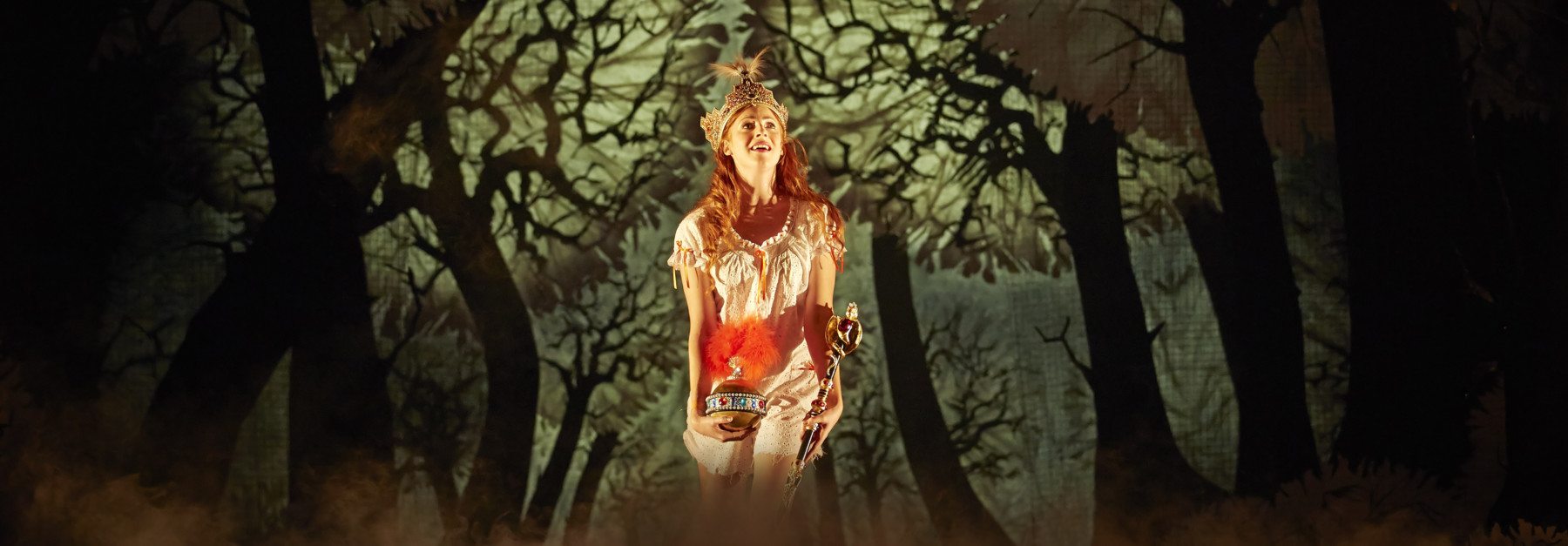‘The Light Princess’ Falls Heavily into Musical Oblivion
A new musical comes to the National Theatre this season and it’s been five years in the making. The suspense hasn’t done it any service, however, because though commissioned by Nicholas Hynter as a darker fairytale antidote to the typical West End musical, Tori Amos’ creation The Light Princess lacks emotional resonance and rejects sincere storytelling for cop-out, easy solutions. Loosely based on George Macdonald’s Scottish novel of 1864, singer-songwriter Amos along with Samuel Adamson have written both a musical that is frivolous and characters who remain lifeless and passive in spite of an excellent cast.
Princess Althea, the ‘light’ princess, floats around the stage as she sings along to Amos’ music: ‘I’m done, Father, Keep your crown, I swear you’ll never bring me down! I am not queen material!’ A teenage girl fraught and light with the grief of her mother’s premature death, she is oppressed by both her kingdom and her father, the kindly King Darius (Clive Rowe) standing in the way of her laid-back lifestyle. Rosalie Craig’s astonishing performance portraying this feathery, ethereal princess was marred by the musical’s over-simplistic story of rebellion and love. Princess Althea was matched with an obvious partner in the form of Digby (Nick Hendrix) in Seaworld, whose own mother’s death causes him to become heavy and unable to smile at anything. This ever-so-cliched setting is only added to throughout and the two inevitably fall in love at first sight, die and are resurrected with seeming ease and fluidity.
Nevertheless, the visual spectacle and creative staging by Marianne Elliott has made this show at least look amazing, for where the story dragged out and the plot was thin, the inventions of the imaginary world appeared in beautiful relief. This elegance stood out in the presence of a clunky script and unambitious character development.
I did really want to like this production. Aside from the slightly ‘tacked on’ approach of beginning the musical by ‘filling in’ the audience of the story, the quality of the performance was stunning. It is not, however, a question of whether Amos’ musical is an enjoyable experience but whether as a whole The Light Princess is anything but deeply flawed. The story lacks substance and though there appears to be moral depth on the surface, beneath it is all frivolity and easy solutions. This left me slightly perturbed; craving the unforgiving consequences of fate and injustice which could easily have been included to create a more lurid script, rather than being masked in a hyper Disneyfied creation. In turn, this spoilt the performances of the fantastic cast, whose unorthodox acrobatics and imaginative playmaking should be praised. However, where the script lacked richness it was difficult as a result to find empathy with the characters, and as much as I actively wanted to relate to the them their lifelessness and passivity presented me with little to sympathise with. This may be attributed to the design of characters who lacked the ability to communicate real feelings, but further, I never felt like I wanted to know what they were feeling. I simply did not care for them, so instead of being compelled and riveted by the musical it instead left me irked and perplexed.
The production informs us that it is unsuitable for those under the age of 14, but where they found reason for such guidance I find hard to discern. I saw a play that had the ideas and motifs available to create a play fraught with concerns and discussion about feminism, sex, freedom and injustice; but instead these topics were shrugged off and pursued without enough confidence. It seemed that the musical was holding back, for fear it might become too oppressive or inaccessible to all, opting for a more commercial, lucrative response.
I left the theatre with mixed feelings, trying to justify the decisions made by the production team and finding elements that constantly frustrated me. Hytner’s commission to create a darker musical that would appeal to the audiences of the National Theatre as opposed to the likes of Broadway and the West End, seems to have produced the opposite effect, verging on pantomine and not helped by the animated pictures projected at the back of the stage.
For me this production was resurrected only by a ballad sung by Althea’s father about how he might lose his ‘little girl’ in a scene which was followed up by Althea’s best friend, Piper (Amy Booth-Steel) roaring out a powerhouse number which stole the show and ultimately saved it for me. The characters contained in the songs are the ones that I wanted to get to know which is a testament to Amos’ inextricable ability to create gutsy songs, that lift this production out of a somewhat failed attempt to create a play about young forbidden love.

Comments